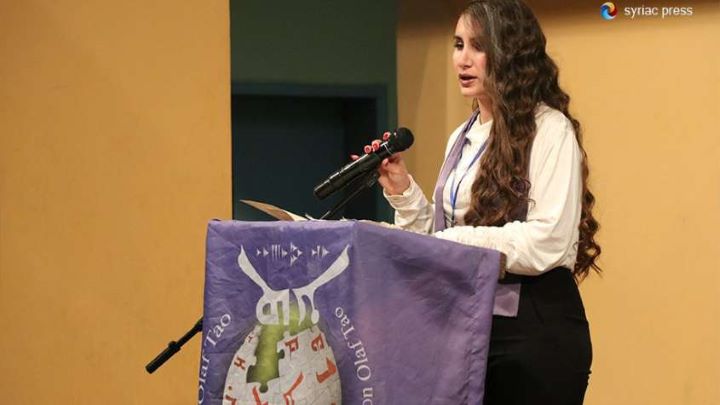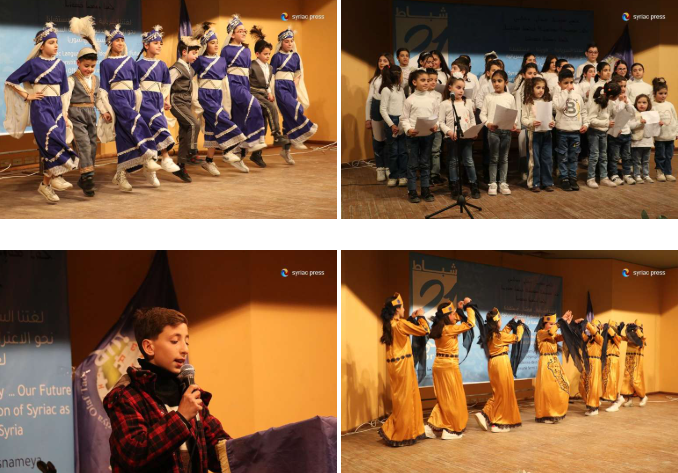International Mother Language Day: Olaf Taw Language symposium celebrates the Syriac language in Beth Zalin (Qamishli)
BETH ZALIN (Qamishli), North and East Syria – In a celebration reflecting the importance of preserving cultural and linguistic heritage, the Olaf Taw Association for Syriac Language, in collaboration with the Syriac Strategic Studies Center, organized a scientific and cultural language symposium on the occasion of International Mother Language Day. The event featured various segments aimed at highlighting the significance of the Syriac language and strengthening its presence among different communities in the region.
A diverse program honoring the Syriac Language
The event commenced with a moment of silence in honor of the Martyrs, followed by a scientific presentation by Syriac researcher Jacques Karim from the Syriac Strategic Studies Center. His presentation explored the historical significance of the Syriac language and the challenges it faces in modern times. The symposium also featured poetry readings in Syriac, including a remarkable participation from an Arab child who recited poetry in Syriac, demonstrating the dissemination of the language across different communities.
A unique segment of the event showcased two teachers of Arab and Kurdish origins who successfully learned Syriac and now teach it at the Syriac Language Center. This exceptional experience reflects cultural integration and exchange of knowledge. Additionally, the scouts of the Syriac Cultural Association performed traditional Syriac folkloric dances before the symposium concluded with a speech by Josephine Somi, the branch administrator of Olaf Taw Association in Zalin (Qamishli).
The Syriac language should be celebrated daily
In an exclusive statement to SyriacPress, Josephine Somi emphasized the importance of the day, stating that celebrating the mother tongue should not be limited to an annual occasion but should be part of the daily lives of Syriacs. She stated:
“If we do not preserve our Syriac language and pass it on to future generations, it will disappear. We must all work to strengthen it and increase its presence in schools, as this is the best way to ensure its continuity.”
A passion for the Syriac language despite challenges
For her part, teacher Hanaa Abdul Jabbar Arar, who has been teaching Syriac at the Olaf Taw Association for Syriac Language
since 2017, spoke about her unique experience in learning and teaching the language. She said:
“I initially entered the field of Syriac teaching as a means of earning a livelihood after moving from Aleppo [Holeb], but over time, I became deeply attached to it and developed a strong love for it. Syriac is a Semitic language with deep historical roots, and many Arabic words originate from it.”
Arar highlighted the challenges she faced, particularly societal perceptions, saying:
“Some people would ask me: You are not Christian, why are you learning Syriac? My response was always that anyone has the right to learn any language, just as an English teacher does not necessarily have to be English!”
She added that learning different languages enhances understanding among communities and strengthens social bonds in the region.
Syriac should be officially recognized in Syria
Speaking to SyriacPress, Syriac researcher Jacques Karim from the Syriac Strategic Studies Center emphasized that his lecture at the symposium focused on the necessity of recognizing Syriac as an authentic heritage language in Syria. He stated:
“The Syriac language faces significant challenges that require urgent action to preserve it and ensure its presence in educational and cultural institutions. We need to strengthen the role of active Syriac institutions and advocate for official recognition of the Syriac language in the Syrian constitution.”
Syriac is a language of civilization and identity
Lawyer Suhail Danho from the Hammurabi Forum for Christian Lawyers in the Gozarto (Jazeera) expressed his happiness in participating in this symposium, noting that the event was rich in segments emphasizing the importance and historical depth of the Syriac language. He said:
“On the occasion of International Mother Language Day, I extend my congratulations to all the peoples of the world. Unfortunately, some nations have forgotten their original languages, but Syriac has endured despite all odds. It is a language of great civilization that has contributed immensely to humanity and remains present in our prayers, songs, and celebrations.”
Danho added:
“All of Syria bears a clear Syriac imprint, from the names of villages and cities to the archaeological discoveries made daily. This language has not died; rather, it stands as the greatest witness to the magnificence of this people, and it deserves national and constitutional recognition.”
The symposium concluded with a clear message emphasizing the importance of strengthening the status of the Syriac language in Syrian society—not limiting it to a single group but encouraging all communities to learn and master it. As Josephine Somi stated:
“Language is not just words; it is identity, culture, and belonging. We must all protect it to ensure its survival for future generations.”
For the article in Arabic see here

























